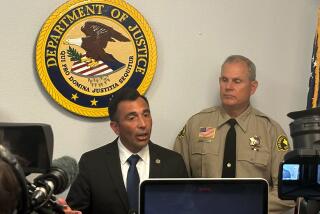Prosecutor Hits Young’s Credibility in Fraud Case
- Share via
Portraying former legislator Bruce E. Young as a man who sold both his integrity and political independence, a federal prosecutor told jurors Thursday that the ex-Norwalk assemblyman should be found guilty of “a scheme to defraud” Californians out of their right to honest government.
“His word is not worthy of belief,” said Chief Assistant U.S. Atty. Richard E. Drooyan. “One of the big things in this case is the defendant’s credibility. I submit his testimony was false, it was misleading and it was evasive.”
Drooyan launched his assault on Young’s performance as a witness during closing prosecution arguments at the end of a monthlong trial on political corruption charges stemming from Young’s relationship with convicted political corrupter W. Patrick Moriarty and two cable television firms.
One major element in the government’s case against Young was his free use of a leased Ford Bronco while working as a consultant to Moriarty in 1981 during a period when Young was also championing pro-fireworks legislation that would have doubled the profits of Moriarty’s fireworks company.
Sarcastically dismissing Young’s contention that his consulting work for Moriarty was not tied to his support for the fireworks bill, Drooyan asked the jury:
“How independent was he? What would have happened to Mr. Young’s Bronco if he had said to Mr. Moriarty, ‘I’m sorry, I can’t help you with your fireworks legislation. I’m opposed on health and safety grounds?’ ”
Answering his own question, Drooyan said Young “wouldn’t have had it on any skiing trip to Northern California,” or for any other personal use, a charge leveled by the government during the trial.
Charged With Mail Fraud
Young, 40, a legislator from 1976 to 1984, is charged with 28 counts of mail fraud in connection with his business dealings with Moriarty and the two cable television firms--Rogers Cable Systems of Toronto and Falcon Communications of Los Angeles.
The government contends that Young, who operated a consulting firm called Young Thinking Inc. while in the Legislature, violated California political financial disclosure laws by failing to report a $10,000 fee from Rogers Cable and monthly payments of $1,000 from various Falcon subsidiaries.
In his closing arguments, however, Drooyan stressed that the government does not have to prove any actual violation of California law to convict Young of a general pattern of deceit and fraud under federal mail fraud statutes.
“California laws are relevant as they set a standard of conduct and in measuring Young’s intent,” Drooyan said.
“But it is important to note that the government does not have to prove a violation of state law. We must prove that Young devised a scheme to defraud, that he had intent to defraud and that he used the mails or caused the mails to be used in furtherance of the scheme.”
Drooyan, charging that Young schemed to defraud “the citizens of the state of his honest and loyal services,” noted that Young’s defense lawyers called only six witnesses and charged that they failed to substantiate most of Young’s claims that he was acting in good faith during his various business ventures.
“Young Thinking was a sham,” Drooyan said. “The address was a post office box. The staff was Young’s district legislative staff. . . . This was Bruce Young’s way of profiting because he was a member of the California Legislature.”
Jury deliberations are scheduled to begin next week at the conclusion of closing arguments. George Walker, Young’s chief defense lawyer, is expected to argue today that Young did not violate any California political reporting statutes and should not be held accountable to a separate federal standard of acceptable political behavior.
More to Read
Sign up for Essential California
The most important California stories and recommendations in your inbox every morning.
You may occasionally receive promotional content from the Los Angeles Times.









